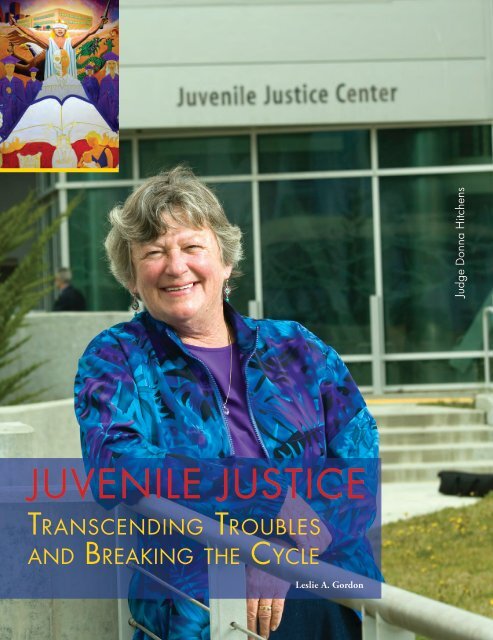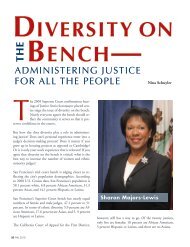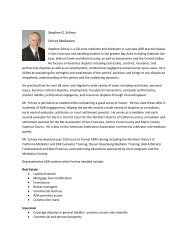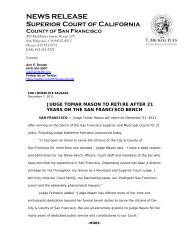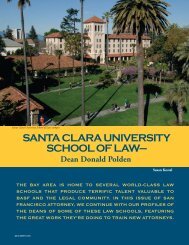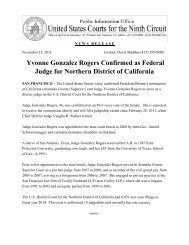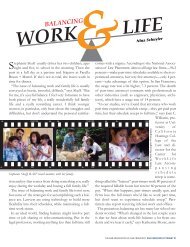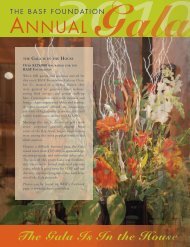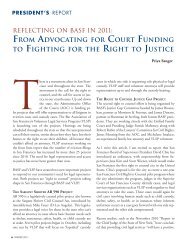JUVENILE JUSTICE - The Bar Association of San Francisco
JUVENILE JUSTICE - The Bar Association of San Francisco
JUVENILE JUSTICE - The Bar Association of San Francisco
Create successful ePaper yourself
Turn your PDF publications into a flip-book with our unique Google optimized e-Paper software.
Judge Donna Hitchens<br />
<strong>JUVENILE</strong> <strong>JUSTICE</strong><br />
Transcending Troubles<br />
and Breaking the Cycle<br />
Leslie A. Gordon<br />
16 SUMMER 2009
One <strong>of</strong> the principle tenets <strong>of</strong> juvenile court is<br />
that all proceedings are confidential. As a result,<br />
juvenile courts, which are a part <strong>of</strong> <strong>San</strong><br />
<strong>Francisco</strong>’s Unified Family Court, are mysterious<br />
places to most people. But the attorneys who practice<br />
there—along with the judges—are part <strong>of</strong> a distinct<br />
universe, where lawyers on opposing sides have close relationships<br />
and, uniquely, the same goal: to help troubled<br />
youth navigate the system and to get them the help they<br />
need so they can get on with their lives.<br />
Because cases involving youth are <strong>of</strong>ten complicated by<br />
psychological, educational, and behavioral issues, problems<br />
cannot necessarily be solved by a legal resolution<br />
alone. As a result, attorneys in this area also have to be<br />
quasi social workers.<br />
Meanwhile, under the mandates <strong>of</strong> the California Welfare<br />
and Institutions Code, judges face the very tricky task<br />
<strong>of</strong> formulating the “least restrictive” plan for delinquent<br />
juveniles while still protecting the community. Resolving<br />
tension between rehabilitation and punishment is especially<br />
challenging when many kids in the system have<br />
absent parents and, increasingly, mental health problems<br />
including posttraumatic stress disorder from witnessing<br />
pr<strong>of</strong>ound violence, with many <strong>of</strong> the problems cycling<br />
through generations <strong>of</strong> families.<br />
Yet <strong>San</strong> <strong>Francisco</strong> has built a reputation for cutting-edge<br />
approaches with collaborative justice programming.<br />
Commonly referred to as “problem-solving” courts, the<br />
collaborative courts combine judicial supervision with rehabilitation<br />
services. It requires an unusual, coordinated<br />
effort among attorneys, law enforcement, and public service<br />
agencies.<br />
<strong>The</strong> Youth Family Violence Court, for instance, was<br />
founded specifically to rehabilitate youth who have committed<br />
violence toward a family member or in the context<br />
<strong>of</strong> a dating relationship. Services include court supervision<br />
and appearances, violence intervention programs, mental<br />
health services, and child trauma services.<br />
Similarly, the Youth Treatment and Education Center<br />
runs three programs for youth in the juvenile justice system.<br />
<strong>The</strong> core program is the Principal Center Collaborative,<br />
a high school for youth on probation that integrates<br />
behavioral health services<br />
within the school day.<br />
<strong>San</strong> <strong>Francisco</strong>’s unique Unified<br />
Family Court and collaborative<br />
courts create<br />
multiple stakeholders in<br />
the success <strong>of</strong> youth in the<br />
system, including judges,<br />
district attorneys, public<br />
defenders, panel attorneys,<br />
court administrators, community organizations, and<br />
pro bono lawyers. In contrast to typical adversarial<br />
relationships, these stakeholders problem-solve collaboratively,<br />
making youth law both one <strong>of</strong> the most troubling<br />
and and also one <strong>of</strong> the most rewarding areas to<br />
practice law.<br />
<strong>The</strong> Judge<br />
Perhaps no person is more responsible for improvements<br />
in the administration <strong>of</strong> youth law in <strong>San</strong> <strong>Francisco</strong><br />
than Donna Hitchens, supervising judge <strong>of</strong> the<br />
Unified Family Court.<br />
After founding the National Center for Lesbian Rights,<br />
Hitchens won election in 1990 to an open seat on the<br />
bench. She soon witnessed many overlapping issues slip<br />
through the administrative cracks and set forth to unify<br />
the family courts.<br />
As a result, family court judges now take a holistic approach<br />
to families, with delinquency, dependency, family<br />
law, and child support cases all coordinated. Today,<br />
if a foster youth (dependency court) gets arrested (delinquency<br />
court), the two judges are now aware <strong>of</strong> both<br />
cases. For the moment, the courts are not colocated:<br />
delinquency (criminal matters) is at the <strong>San</strong> <strong>Francisco</strong><br />
Youth Guidance Center (YGC), also known as juvenile<br />
hall, in Twin Peaks; dependency, family law, and child<br />
support are at the Civic Center Courthouse.<br />
“<strong>The</strong> goal is ‘one family, one judge.’ We’re not there exactly,<br />
but we’re close. We’ve made a 90 percent improvement,”<br />
Hitchens says during an interview in her chambers,<br />
which is decorated with bears and other stuffed<br />
animals and a framed “I love you mom” card.<br />
Youth Guidance Center photos by Jim Block except as noted.<br />
THE BAR ASSOCIATION OF SAN FRANCISCO SAN FRANCISCO ATTORNEY 17
Today, the growing number<br />
<strong>of</strong> youth in the system with<br />
serious mental health issues and<br />
the dwindling resources to help<br />
them is “an incredible problem,”<br />
she says. “In my opinion,<br />
it’s the result <strong>of</strong> violence<br />
in the home and in the community.<br />
Many <strong>of</strong> the kids<br />
have undiagnosed posttraumatic<br />
stress disorder.”<br />
Fortunately, Hitchens adds, <strong>San</strong> <strong>Francisco</strong> has “an incredibly<br />
dedicated group <strong>of</strong> attorneys” working together to<br />
help them. “<strong>The</strong> PDs, the DAs, the panel attorneys: it’s a<br />
community.” <strong>The</strong>y may technically be on opposing sides<br />
<strong>of</strong> a case, but, “ultimately, they do want the same thing.”<br />
Anyone practicing law in this area must be “incredibly patient,”<br />
Hitchens adds. “You have to have a little bit <strong>of</strong> a<br />
social worker in you—you step out <strong>of</strong> a straight lawyer<br />
or straight judge role. <strong>The</strong> task is more complex, much<br />
broader than looking up sentencing guidelines.”<br />
In particular, judges in this area must be willing to take<br />
risks. “<strong>The</strong> hardest cases to decide are those involving<br />
younger juveniles who’ve committed an act <strong>of</strong> violence or<br />
who’ve been caught with a gun, even if they never used<br />
it. You can’t lock every kid up. You put the best orders<br />
in place. And remember, no one counts the kids who are<br />
released and do just fine. <strong>The</strong> vast majority <strong>of</strong> kids don’t recidivate.”<br />
Indeed, most kids at the Youth Guidance Center<br />
are not repeat <strong>of</strong>fenders: in 2008, the recidivism rate was<br />
only 3 percent.<br />
result, decisions “are harder than they used to be. On a<br />
case-by-case basis, we construct orders that can rehabilitate<br />
a child and improve the child’s opportunities for success.<br />
But no one has the crystal ball; there’s no cookie cutter.<br />
Kids come from very different circumstances.”<br />
Not surprisingly, for lawyers and judges focused on troubled<br />
youth, coping mechanisms are essential. “It helps to<br />
have a good family life,” says Hitchens, whose partner is<br />
Nancy Davis, a civil division judge. <strong>The</strong>y have two daughters.<br />
“Our kids have left the nest, but they were four and<br />
six when I became a judge. I could come home from work<br />
and be so grateful that my kids were healthy and they had<br />
hopes and dreams.” Hitchens also spends time gardening<br />
and fishing.<br />
For Bay Area attorneys who may be learning about <strong>San</strong><br />
<strong>Francisco</strong> youth law for the first time, Hitchens says the<br />
most important service adults can provide these kids is<br />
that <strong>of</strong> a mentor. “An adult mentor helps them focus, gives<br />
them positive ways to use their energy, provides job readiness,<br />
and helps them achieve academically. Any successful<br />
person in the world will tell you they had parent mentors<br />
or a coach or an eleventh-grade math teacher who cared<br />
about them one on one.”<br />
<strong>The</strong> Assistant District Attorney<br />
By way <strong>of</strong> example, Hitchens recalls when a young man<br />
wearing a suit came into her court unannounced a few<br />
years ago and asked to speak with her. “It turns out he<br />
came in to thank me. I had given him a second chance<br />
[when he was younger], and he was on his way to college.”<br />
Yet other cases still haunt her, like the teenage mother who<br />
had committed violence. Hitchens chose to place the girl<br />
and her child in a safe, appropriate place. <strong>The</strong> Court <strong>of</strong><br />
Appeal overruled Hitchens and the girl was sent to adult<br />
court. “She hooked up with tough folks,” Hitchens recalls.<br />
“She was rearrested and ended up abandoning her child.”<br />
Today, more kids with weapons and more kids committing<br />
robberies are winding up in Hitchens’s court. As a<br />
18 FALL 2009<br />
Rani Singh
When District Attorney Kamala Harris was looking for<br />
someone to handle juvenile gun cases after receiving a<br />
grant in 2005, Rani Singh threw up her hand.<br />
“I have always been interested in juvenile work,” explains<br />
Singh, who had been handling felony domestic violence<br />
and stalking cases in adult court. “I was a sociology major<br />
with an emphasis in juvenile justice and had even considered<br />
getting a master’s in social work.”<br />
Today, Singh is one <strong>of</strong> six assistant district attorneys who<br />
work with juveniles. She is the assigned DA for the collaborative<br />
courts, and her specialties include gun and serious<br />
sex crimes cases.<br />
<strong>The</strong> Public Defender<br />
Representing youth in delinquency<br />
court requires public<br />
defenders to get involved in a<br />
host <strong>of</strong> “collateral” issues, says<br />
Patricia Lee, <strong>of</strong> the <strong>San</strong> <strong>Francisco</strong><br />
Office <strong>of</strong> the Public Defender,<br />
which represents 1,400<br />
youth a year, some as young as<br />
eleven. Lee, the managing attorney,<br />
oversees a staff <strong>of</strong> seventeen<br />
in the juvenile unit, including seven attorneys.<br />
Unlike adult court, the juvenile court operates on a rehabilitation<br />
model rather than a punishment model, says<br />
Singh, who handles about one hundred files at a time.<br />
Plus, she adds, “it’s much more collaborative than adult<br />
court. I’m getting involved with parents even though I’m<br />
a DA.” Singh says kids in delinquency court have even<br />
called her personally before a hearing to admit, “I’m not<br />
clean.” In adult court, in contrast, Singh “never personalized<br />
the defendants. I never looked at them.”<br />
A mother <strong>of</strong> two young children and a native <strong>San</strong> Franciscan,<br />
Singh believes that DAs who want to work in juvenile<br />
court need to have a sixth sense. “Some kids, you know<br />
you’ll see later in adult court,” she explains, noting factors<br />
like the severity <strong>of</strong> the crime, the age they enter the system,<br />
the family structure, and collateral problems like school,<br />
gang, or drug issues. “Other times, you see the kid and you<br />
know they’ll never come back.”<br />
Singh is married to a deputy sheriff, and their two sometimes<br />
“icky jobs” make them realize how lucky they are—<br />
and how important parents are. Singh recalls a mother<br />
who reeked <strong>of</strong> marijuana in a courtroom, yet yelled at<br />
her. “‘Why are you locking up my baby’ Doing this work<br />
makes me sad and grateful. It makes me angry at parents,”<br />
Singh says.<br />
Yet while some DAs hate doing juvenile work, Singh<br />
doesn’t. “If I see one success story in ten, that’s great because<br />
in adult court, I saw no success.”<br />
Patricia Lee<br />
Collateral issues include educational proceedings like<br />
expulsion and individualized education plans. “We know<br />
the importance <strong>of</strong> keeping kids in school. Many kids<br />
are not bad kids but simply failures <strong>of</strong> the school system.<br />
Many are special education or have mental or behavior<br />
health issues,” Lee explains. “We’ve approached<br />
the problems holistically. Success can be measured by<br />
THE BAR ASSOCIATION OF SAN FRANCISCO SAN FRANCISCO ATTORNEY 19
ecidivism, but also by the<br />
right school placement.”<br />
Many <strong>of</strong> the public defender’s<br />
clients are at the Youth Guidance<br />
Center, a short-term<br />
youth detention facility that<br />
provides residential services<br />
for 132 youth. Those kids are<br />
in custody awaiting investigative<br />
action immediately after<br />
admission, in custody per court order pending further<br />
court hearings, or in custody awaiting placement. Kids<br />
at the YGC receive educational, medical, and mental<br />
health services as well as socialization skills training and<br />
general counseling.<br />
Because some youth wind up on probation for several<br />
years, Lee and her staff get to know them and their complicated<br />
issues. “We don’t just defend. We help them get<br />
guardianship, relocate, find tutoring services.”<br />
She’s also observed an increase in territorial or “turf” issues.<br />
“When the city had it’s backpack giveaway, one giveaway<br />
location had to be up a hill and then we had to provide a<br />
separate giveaway down the hill” because the kids wouldn’t<br />
travel even short distances through areas inhabited by<br />
rival gangs.<br />
Despite the institutional obstacles and emotional challenges<br />
<strong>of</strong> defending delinquent youth, Lee firmly believes<br />
every child should be afforded an opportunity. “Most<br />
youth who come through here don’t know what opportunity<br />
means. If we save one child in a year, that’s the reward<br />
for working in the juvenile justice system. We give them<br />
tools and opportunities to move out <strong>of</strong> the system. Ten<br />
percent are hard core and will move into the adult system.<br />
But first-time <strong>of</strong>fenders A lot <strong>of</strong> these kids will succeed.<br />
We’ve had kids go on to college. To be part <strong>of</strong> that process,<br />
that’s the reward.”<br />
<strong>The</strong> Court Administrator<br />
According to Lee, few public defenders provide the level <strong>of</strong><br />
representation to youth that <strong>San</strong> <strong>Francisco</strong>’s does. “Many<br />
kids in other jurisdictions joke about ‘public pretenders’<br />
or ‘public <strong>of</strong>fenders.’ But we don’t hear that,” she says.<br />
“We’ve developed a level <strong>of</strong> credibility within the system<br />
and community.”<br />
<strong>The</strong> mother <strong>of</strong> four daughters, Lee joined the public defender’s<br />
<strong>of</strong>fice in 1985. She began her career focusing on<br />
gender differences and found that more resources were allocated<br />
to boys in the system. Now more services are devoted<br />
to girls, which is fortunate because the majority <strong>of</strong><br />
girls—as many as 90 percent—have suffered sexual abuse,<br />
abandonment, neglect, mental health, or behavioral issues,<br />
Lee says.<br />
Other changes that Lee has witnessed include fewer crack<br />
cases, but a surge in violent crimes—robberies, weapons<br />
possessions, shootings—by “teenage boys from the poorest<br />
<strong>of</strong> poor communities,” Lee says. “<strong>The</strong>y’re raised by family<br />
members because their fathers are in jail, are in prison, are<br />
deceased, or have been killed. <strong>The</strong>se boys don’t expect to<br />
live past age twenty. We have a high level <strong>of</strong> young people<br />
with serious mental health issues and cognitive deficiencies,<br />
especially those from drug-addicted mothers.”<br />
Claire Williams<br />
20 FALL 2009
<strong>The</strong> main premise <strong>of</strong> <strong>San</strong> <strong>Francisco</strong>’s Unified Family Court<br />
is to deal with families, not individual cases, explains Claire<br />
Williams, the court’s administrative director.<br />
Before unification, a situation might occur in which parental<br />
rights would be terminated in a dependency case;<br />
but if the child later faced criminal charges, the delinquency<br />
court judge, unaware <strong>of</strong> the dependency case, might<br />
release the child back to that parent. Today, however, cross<br />
cases are flagged. At the very least, each judge dealing with<br />
the family now knows about what the other judge is doing.<br />
“We’re headed to one judge, one family: no matter what<br />
door the child came through, the judge would keep the<br />
case,” Williams says. “We’re still working on that. It’s baby<br />
steps.” In the meantime, the judges talk to each other and<br />
to relevant agencies on an as-needed basis. Standing orders<br />
are in place allowing attorneys to communicate.<br />
<strong>The</strong> Public Interest<br />
Lawyer<br />
Public interest attorneys representing<br />
youth <strong>of</strong>ten have to<br />
shift their legal practices to<br />
respond to community needs.<br />
Case in point: a year-old city<br />
policy established by the mayor’s<br />
<strong>of</strong>fice requires that any<br />
undocumented minor who is<br />
booked—not charged—with a<br />
felony must be reported to immigration. Since last July,<br />
130 youth have been reported, resulting in an “onslaught”<br />
<strong>of</strong> cases for Legal Services for Children (LSC), a nonpr<strong>of</strong>it<br />
agency providing legal services to disadvantaged youth,<br />
says director Abigail Trillin.<br />
Another goal is to create consistency and efficiencies across<br />
court orders. “We don’t want the family to have to do one<br />
thing in one system and another thing in another system.”<br />
A former family law lawyer, Williams found herself<br />
“burned out” with family law practice, largely because<br />
she wasn’t good at setting boundaries. “Families will<br />
continue to have problems after representation,” she explains.<br />
“You’re not a knight in shining armor—and you<br />
have to know you’re not or else you’ll take on too<br />
much responsibility.”<br />
Today, most <strong>of</strong> Williams’s work at the court deals with<br />
programs—specifically, finding grants and then overseeing<br />
the administration. She also serves as a liaison to the bench<br />
for dealing with outside agencies. “My job is extremely<br />
collaborative,” says Williams, who has five managers reporting<br />
to her and has no fewer than twenty-five regularly<br />
scheduled meetings. “We’re fortunate in <strong>San</strong> <strong>Francisco</strong>.<br />
We have a fabulous group <strong>of</strong> attorneys, an extremely committed<br />
bar.”<br />
Lawyers who work on youth cases need to be flexible, she<br />
adds. “It’s quasi social work. Lawyers must be empathetic<br />
and understand the bigger picture: how best to create a<br />
resolution that the child and the family can live with.”<br />
Attorneys in this area who are “strict and formal” are too<br />
short sighted, she says. “<strong>The</strong>y may win the battle today,<br />
but you need to look down the road. You can’t look at the<br />
child in a vacuum.”<br />
Abigail Trillin<br />
THE BAR ASSOCIATION OF SAN FRANCISCO SAN FRANCISCO ATTORNEY 21<br />
Photo by Lorraine Lee Nelsen
This immigration rule is so<br />
broad, according to Trillin, that<br />
it includes youth who’ve lived in<br />
the United States “forever” with<br />
their parents. “<strong>The</strong>y’re facing<br />
deportation to countries they<br />
don’t consider their home,” she<br />
says. In many cases, “they don’t<br />
even speak the language.”<br />
As a result, LSC has shifted its<br />
focus to assist immigrant youth<br />
in federal detention. If they’ve committed a minor <strong>of</strong>fense,<br />
they’re sent to the Office <strong>of</strong> Refugee Resettlement, an arm<br />
<strong>of</strong> the U.S. Department <strong>of</strong> Health and Human Services.<br />
<strong>The</strong> level <strong>of</strong> placement—a shelter, a staff-secure facility or<br />
juvenile hall—depends on the child’s age and the charges.<br />
Children charged with major <strong>of</strong>fenses are put directly in<br />
the custody <strong>of</strong> U.S. Immigration Services.<br />
LSC helps families reunite while cases are pending and<br />
also lobbies for lower placement, explains Trillin, who has<br />
worked at LSC for thirteen years.<br />
“This is devastating the lives <strong>of</strong> many families,” she says.<br />
“It also undermines the neutrality and confidentiality <strong>of</strong><br />
the system.”<br />
Now unauthorized individuals are looking at otherwise<br />
confidential juvenile files, and youth are being charged<br />
with felonies for otherwise minor violations like graffiti,<br />
Trillin says. “This policy undermines the work <strong>of</strong> the court<br />
to rehabilitate and, frankly, undermines public safety in<br />
our city. Now immigrant youth are more isolated and<br />
more likely to commit crimes. A graffiti charge is a very<br />
solvable case: they used to be able go into the public art<br />
program and do murals.”<br />
Especially troubling for Trillin is that the mounting immigration<br />
cases take her staff away from other pro bono<br />
work they could be doing.<br />
Founded in 1975 as one <strong>of</strong> country’s first nonpr<strong>of</strong>it law<br />
firms devoted to youth, LSC provides multidisciplinary,<br />
holistic advocacy with social worker–attorney teams. Although<br />
it doesn’t practice in delinquency court, LSC handles<br />
legal issues regarding dependency, education, guardianship,<br />
and immigration. It also <strong>of</strong>fers an advice line and<br />
drop-in clinics.<br />
Last year, LSC provided counsel to 121 youth in dependency<br />
court and helped 288 youth avoid foster care by<br />
establishing guardianships. <strong>The</strong> organization is funded by<br />
county money, foundations, grants, individual giving, and<br />
some court fees.<br />
A former teacher <strong>of</strong> bilingual third graders, Trillin now<br />
manages LSC’s social workers and seven attorneys as well<br />
as the two hundred lawyers on a pro bono panel. Everyone<br />
on her team is either a “closet social worker or a closet<br />
lawyer,” she quips. “<strong>The</strong>y have an interest in both areas.<br />
Family problems are complex and are rarely solved by a<br />
legal solution only.”<br />
For the kids, the process <strong>of</strong> receiving good representation<br />
is “really powerful for them,” Trillin adds. “Even in cases<br />
when they lose, they learn that a person believes in them.<br />
And for the lawyer, the work is incredibly rewarding.”<br />
LSC’s model, Trillin adds, is to be the attorneys for the minor—not<br />
the guardian ad litem. “<strong>The</strong>y are the client,” she<br />
says. “And people are surprised to hear that young people<br />
need lawyers.”<br />
BASF’s Conflicts Panel<br />
Since the 1970s the juvenile courts, which are a part <strong>of</strong><br />
<strong>San</strong> <strong>Francisco</strong>’s Unified Family Court, have looked to <strong>The</strong><br />
<strong>Bar</strong> <strong>Association</strong> <strong>of</strong> <strong>San</strong> <strong>Francisco</strong>’s Lawyer Referral and Information<br />
Service Conflicts Panel to provide qualified and<br />
experienced lawyers to represent minors that cannot be<br />
represented by the public defender because <strong>of</strong> a conflict <strong>of</strong><br />
interest. Panel attorneys, like their public defender counterparts,<br />
must be knowledgeable about public and private<br />
resources, for each minor presents a myriad <strong>of</strong> problems<br />
that have led him or her to juvenile court.<br />
<strong>The</strong> panel attorney not only defends the criminal charge<br />
but also acts as an advocate in special education proceedings,<br />
school expulsion hearings, and program placement.<br />
Panel attorneys access social workers, mental health consultants,<br />
community-based programs, and other resources<br />
necessary for a holistic representation <strong>of</strong> their clients.<br />
22 FALL 2009
Some attorneys form relationships with their young clients<br />
that may last into adulthood.<br />
Three members <strong>of</strong> BASF’s Conflicts Panel, Lisa Dewberry,<br />
Joseph Tomsic, and Ruth Edelstein represent a cross-section<br />
<strong>of</strong> the panel and its experience.<br />
Lisa Dewberry<br />
Lisa Dewberry<br />
“It’s the autonomy I like,” reports Lisa Dewberry. As a former<br />
public defender and former supervising attorney for<br />
the public defender’s juvenile division, Dewberry’s practice<br />
has spanned both public and private <strong>of</strong>fices. “I’m not<br />
subjected to any policy considerations <strong>of</strong> a government <strong>of</strong>fice;<br />
my practice, my resources, my experience, and what I<br />
bring to each case have expanded dramatically by virtue <strong>of</strong><br />
a private practice.” <strong>The</strong>re is camaraderie and a sharing <strong>of</strong><br />
experience broader than the support <strong>of</strong>fered by the public<br />
defender, for Dewberry practices in multiple jurisdictions,<br />
gaining experience, insight, and a longer list <strong>of</strong> experts<br />
and consultants to add to her already remarkable experience<br />
during twenty-nine years, including twenty-three as<br />
a public defender.<br />
Though Dewberry’s caseload includes adults in the criminal<br />
courts, the draw to work with youth is a strong one.<br />
“We are so much more creative in our approach with<br />
youth. We have real impact on the outcome for many <strong>of</strong><br />
these juveniles for we must do<br />
more than defend the charges;<br />
we work hard to shape futures<br />
by presenting the court with<br />
workable options.”<br />
Too <strong>of</strong>ten the court is the only<br />
“safety net” available to these<br />
youth. Dewberry <strong>of</strong>fers an example<br />
<strong>of</strong> a young client who<br />
faced robbery charges. His<br />
mother, a crack addict, lost parental<br />
rights by court order. With no one to care for him,<br />
he found himself in the care <strong>of</strong> a stranger who not only<br />
used him sexually but, “to earn his keep,” instructed him<br />
how to commit strong-arm robberies. Although the case<br />
was factually difficult to defend, “I convinced the prosecutor<br />
to keep the case at YGC instead <strong>of</strong> sending this kid<br />
downtown to be prosecuted as an adult; we not only found<br />
real program support for this kid, the psychological evaluation<br />
was so compelling that the two prosecutors were<br />
clearly moved and became role models, letting this kid<br />
know that they cared about him—that they cared about<br />
his future. Sure, he has to be accountable, but what’s so<br />
interesting about juvenile practice is that the very same<br />
people who are prosecuting can actually play a therapeutic<br />
role given the collaboration possible only at YGC.”<br />
Joseph Tomsic<br />
Joe Tomsic is a private practitioner specializing in juvenile<br />
law and a member <strong>of</strong> BASF’s Conflicts Panel since 1991.<br />
His private practice takes him to Marin, <strong>San</strong> Mateo, Sonoma,<br />
and <strong>San</strong>ta Clara, but Tomsic finds that <strong>San</strong> Fran-<br />
Joseph Tomsic<br />
Photo courtesy <strong>of</strong> Joseph Tomsic
cisco’s juvenile court—unlike<br />
those in neighboring counties—<br />
creates an atmosphere conducive<br />
to collaboration. “This collaborative<br />
approach makes the<br />
work here highly productive;<br />
here, attorneys have ready access<br />
to probation <strong>of</strong>ficers, district attorneys,<br />
and bench <strong>of</strong>ficers. This<br />
facilitates, rather than frustrates<br />
the goals <strong>of</strong> the work.”<br />
Tomsic finds that not only do panel attorneys share the<br />
same passion for this work but they also are a highly skilled<br />
group. “Panel attorneys know what they’re doing; we must<br />
apply regularly to do panel work, hone and improve our<br />
skills constantly, all <strong>of</strong> which is reviewed regularly. We are<br />
not members <strong>of</strong> an agency or <strong>of</strong>fice where it’s difficult to<br />
get fired.” According to Tomsic, attorneys who practice at<br />
YGC are a tight-knit group and regularly exchange and<br />
discuss ideas, research, pleadings, and experience. Practice<br />
at YCG has been and remains a perfect fit for Joe Tomsic.<br />
Ruth Edelstein<br />
Former public defender, former city attorney with seven<br />
years <strong>of</strong> private practice sandwiched in between, Ruth<br />
Edelstein returned to private practice in 2004 and is highly<br />
regarded at YGC, the Hall <strong>of</strong> Justice, and dependency<br />
departments. Her clients, <strong>of</strong>ten accused <strong>of</strong> the most serious<br />
crimes in adult and juvenile court, have also included<br />
parents and children in the dependency system. Her<br />
experience as a city attorney representing social workers<br />
in dependency proceedings provided the additional background<br />
unique to dependency court. In short, there’s<br />
almost no aspect <strong>of</strong> juvenile work that Edelstein<br />
“doesn’t get.”<br />
Edelstein finds that working with youth is far more compelling<br />
than adults. “Kids need and are open to relationships<br />
with caring adults; they are truly looking for a way<br />
to connect and this permits the practitioner a window <strong>of</strong><br />
opportunity to impact kids’ lives; relationships make the<br />
critical difference.”<br />
As a private attorney, “I have more time to develop these<br />
relationships than I did when I ran a calendar in a courtroom.<br />
<strong>The</strong>re’s a freedom to connect, really connect, that’s<br />
unique to private practice and highly rewarding.”<br />
<strong>The</strong> stakes in criminal prosecutions are extraordinarily<br />
high, and “if we can save our youth from the adult system,<br />
we’ve done our job.” Kids make incredible mistakes,<br />
rarely able to calculate the risks or consequences <strong>of</strong> their<br />
actions given their developmental limitations. As a result,<br />
many face a lifetime in prison if they reach adult court.<br />
<strong>The</strong>refore, keeping them in the juvenile system while they<br />
mature is paramount to the work <strong>of</strong> the juvenile practitioner.<br />
“Our job is to know our clients and advocate that each<br />
child is a valuable human being, capable <strong>of</strong> change, deserving<br />
to be saved from a lifetime <strong>of</strong> incarceration.”<br />
A former lawyer, Leslie A. Gordon is a freelance legal journalist<br />
living in <strong>San</strong> <strong>Francisco</strong>. She can be reached at leslie.<br />
gordon@stanfordalumni.org.<br />
Julie Traun, a private practitioner and attorney administrator<br />
for BASF’s Lawyer Referral and Information Service’s Indigent<br />
Defense Administration, assisted with this article.<br />
Ruth Edelstein<br />
24 FALL 2009


